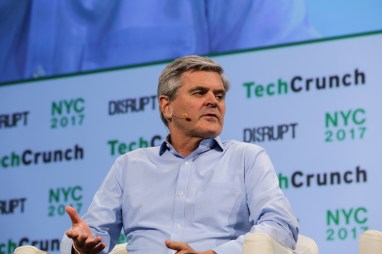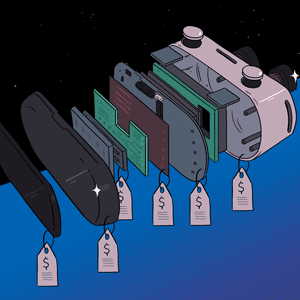BSI Innovation blogs about Innovation, Money, Venture Capital, Grants, Exports and Research and Development (R&D)
Alliance Partners
Thursday, December 14, 2017
Wednesday, December 13, 2017
Work is different , not dead

Wednesday, December 06, 2017
BSI Grants Landscape
Contact the team at
BSI Innovation Pty Ltd
Level 7, 14 Martin Place, SYDNEY NSW 200 (02) 9126 9100

Steve Case , Jeff Bezos , Eric Schmidt and a bunch of other billionaires look outside the Valley

AOL co-founder Steve Case and a bunch of highly prominent tech billionaires including Amazon’s Jeff Bezos and Alphabet’s Eric Schmidt have set up up a $150m Rise of the Rest seed fund for startups in the Midwest and other areas that are often overlooked by investors.
As The New York Times puts it, the complete list of investors in the Rise of the Rest fund “may be the greatest concentration of American wealth and power in one investment fund.” In addition to Bezos and Schmidt, it includes:
- Starbucks chairman Howard Schultz
- Fashion designer Tory Burch
- Bridgewater Associates founder Ray Dalio
- Quicken Loans founder Dan Gilbert
- KKR co-founder Henry Kravis
- Carlyle Group co-founder David Rubenstein
- Financier and philanthropist Michael Milken
- Kleiner Perkins Caufield & Byers chairman John Doerr
- Breyer Capital founder Jim Breyer
- Napster co-founder and former Facebook president Sean Parker
- Spanx founder Sara Blakely
- Tampa Bay Lightning and the Tampa Bay Storm owner Jeff Vinik
- Banker Byron Trott
- Goldman Sachs leader director Adebayo Ogunlesi
- and members of the Walton, Koch and Pritzker families
The fund, which shares a name with Case’s speaking tour and startup pitch competition, plans to provide mentorship as well as financing to entrepreneurs located outside of Silicon Valley, New York City, Boston and other major business hubs.
Case told The New York Times that the Rise of the Rest fund isn’t a social impact fund, but instead seeks to increase investment in underserved regions by proving companies there can “generate top returns.”
Case believes that there are returns in areas that are further than a 1 hour drive from their offices in the Valley.
“I felt it was a no brainer,” says Eric Schmidt, chairman of Google parent Alphabet. “Investing in this way is good for everyone: more jobs, more wealth, better products and it helps our society in dealing with a lot of jarring employment changes,” Schmidt wrote Forbes in an email. “Entrepreneurs, remember, are the job creators in our economy.”
Doerr wrote Forbes. “I don’t think of ‘the Valley’ as some zip code in California. It is a state of mind that can be anywhere, for everyone.”
Tory Burch, the fund has civic appeal. “I see opportunity as an investor and as a citizen who cares about the future of our country,” Burch said by email. “By providing entrepreneurs outside of Silicon Valley with the resources they need to build great businesses, we are disrupting the current investment paradigm and creating a more evenly dispersed innovation economy, which is critical for the future of our country.”
This is a dream team of investors says Case!
“I felt investing in companies outside of Silicon Valley was a no-brainer,” Schmidt told the New York Times. “There is a large selection of relatively undervalued businesses in the Heartland between the coasts, some of which can scale quickly.”
The investment team headed by JD Vance will look to make investments of less than $1 million alongside local partners, not leading rounds or taking board seats. “We hope we can be catalytic, in the visibility we can bring,” says Case.
Tuesday, November 28, 2017
Why invest in Latin America?????
Here are some of the reasons why you should consider invest in Latin America:
* A USD$4.8 Trillion economy
* Over 600 million citizens
* A growing middle-class
* A vast supply of human talent
* Abundance of natural resources
* Has one of the largest automotive sector
* Expansion of resources sector, including mining, oil, gas, and forestry
* Non-conventional renewable energy sources
* Arabic beans and much more ...
#Mexico #Argentina #Peru #Colombia #Brazil#Chile #Belize #Ecuador #Panama #LatinAmerica#Latin #Culture #Business #America #Australia#Europe #Asia #NoemiBarrazueta #CGStrategies#GlobalBusiness #InternationalBusiness #LinkedIn
What do you think?
Thursday, November 23, 2017
How Startup funding works - Splitting the Pie
100% of Nothing is a lot less than 17% of a Company

Wednesday, November 22, 2017
HealthMatch wins Australia’s TechCrunch Startup Battlefield competition
DOMINIC POWELL / Tuesday, November 21, 2017
Sydney-based medical tech startup HealthMatch has won Australia’s first ever TechCrunch Startup Battlefield, winning $25k and a whole lot more!
HealthMatch was founded by Manuri Gunawardena and Arran Schlosberg in 2016, after Gunawardena realised there was a need for an easier way for patients to be matched with clinical trials for new treatments and products.
“I was in my final year of med school working in a brain cancer lab manually helping patients find clinical trials when I realised there was a need for something like HealthMatch,” Gunawardena tells StartupSmart.
“We wanted to get rid of the inefficient manual process, as often patients would have to fill out hundreds of forms to see if they’re eligible and a lot of the time the questions overlapped.”
“It was repetitive for patients to do, but not for algorithms and machine learning.”
With Gunawardena heading up the medical know-how aspect of the business, she pulled co-founder Schlosberg into the mix to deal with the tech side, as “doctor turned software engineer”..
Fifteen startups were picked to pitch at an event held last Thursday before a panel of Australian startup heavyweights, including Blackbird Ventures’ Samantha Wong, Canva founder Melanie Perkins, Blue Sky VC Elaine Stead, and Airtree Venture Capital’s James Cameron.
“It was a great opportunity to be able to have that level of exposure on a global stage – they told us about 500,000 people were watching it worldwide.”
The team has also won an all-expenses-paid trip to San Francisco to pitch at TechCrunch’s flagship Disrupt SF 2018 event, which has helped birth startups like Dropbox and Yammer.
But that isn’t the only opportunity the founders have landed from the event, with Gunawardena saying numerous company founders and mentors chased down the pair after their win, offering “advice, connections, and some great business opportunities”.
This included Mint.com founder Aaron Patzer, which Gunawardena said was looking to “potentially invest”.
“It’s been a fantastic validation of our idea and business model,” she says.
The co-founders will be looking to build that validation out further through a seed round they’re looking to raise next year, while the $25,000 from TechCrunch will be used to help build out the company and to look at hiring staff.
Gunawardena says the startup also wants to look for expansion into other markets, saying Australia is a great place to start, but HealthMatch wants to “bring those innovations to other markets”.
“We want to start going global in the next year, along with growing the number of medical conditions patients can choose from on the platform. Right now we have 12 conditions listed, but we want to put up some more of the rare diseases,” she says.
For other startups keen to get pitching, Gunawardena advises careful consideration and validation of your idea before plonking it in front of investors, saying the number one thing to do is “test the market”.
“Validate what you’re creating and show that your customer will want the thing you’re making. We spoke to a lot of pharmaceutical companies, even though we knew it was a problem for patients, we had to see if it was a problem the companies were facing too,” she says.
“The pitching process was a great opportunity to learn how to structure our pitch – covering all the elements investors are interested in including the market, the business model, the sales strategy. It was good to learn that on a higher level.”
Watch HealthMatch’s pitch here.
Power Ledger receives part of $8 million government grant for Fremantle blockchain energy project
Australian blockchain startup Power Ledger is looking at a new stage of growth in the wake of its $34 million initial coin offering after being named one of the recipients to gain funding in an $8 million government smart cities grant.
Announced this week, the energy trading business joined other recipients, including Curtin University, Murdoch University, CSIRO/Data61, and CISCO with the funding used to trial a blockchain-powered distributed energy and water system in the Fremantle. The government will directly contribute $2.57 million in funding with the additional $5.68 million funded through the project’s partners.
Along with rolling out a trial program, the project will be looking into how cities can effectively use blockchain technologies to moderate energy and water usage. Additionally, the storage and distribution of power will be done through a “community-owned battery”, which Power Ledger co-founder Jemma Green says one part of the company’s part of the grant will go towards purchasing.
“Power Ledger has received $1.3 million from the Department of Prime Minister and Cabinet, and part of those proceeds will go towards purchasing a battery, and part of it will be used to fund the development of the application platform,” she says.
Power Ledger completed its raise of $34 million via one of Australia’s first successful initial coin offerings in October, issuing 540 million POWR tokens to participants who contributed digital currencies such as Ethereum or Bitcoin.
POWR token skyrocketing
Since the raise completed, the POWR tokens have been launched onto online cryptocurrency exchanges such as Bittrex and Binance. According to cryptocurrency price trackers, POWR tokens have seen an increase of approximately 800% since their launch into secondary markets, with the token being worth 55 US cents (73c) at time of publication.
Power Ledger’s founders and developers were allocated 150 million POWR tokens via escrow contract as part of the token sale. Those tokens are now worth approximately $109 million, with an additional $182 million locked in a separate development escrow contract for use “if needed”.
Green says the company is “honestly delighted” with the market’s response to the project, believing it was the company’s ability to demonstrate its product offering stoked investor confidence.
“We’re honestly delighted with the market’s response. Many companies do ICOs with concepts when they haven’t actually developed the platform, where we have a platform with real-life applications,” she says.
While Green was tight-lipped on future online market launches for the token, she was pleased to see “a lot of liquidity” in the secondary market.
The company is looking to roll out further applications for the POWR token, with Green saying that is one of the company’s main focuses. One such potential application, as identified by the project’s whitepaper, would be allowing customers to donate POWR to sustainable energy projects or charities, with an aim of “driving sustainability”.
“As the Ecosystem user-base grows, the demand for POWR tokens will likely increase,” reads the whitepaper.
“We’ve got a pipeline of projects we’re working on which will hopefully see an increase of utilisation for the POWR token. That’s the focus of the business – create projects which will increase the use of the POWR token,” Green says.
Investment a sign of confidence for Aussie blockchain startups
The company and its academic partners put in the submission for the smart cities grant over six months ago and are all “delighted” to see it come to fruition. Green believes while this is not only a boon for blockchain tech in Australia, it’s also a signal the federal government is embracing innovation.
“We are really delighted to see the federal government supporting Australian innovation, and recognising the role blockchain can potentially play for more resilient and efficient ecosystems,” she says.
With Australia having some of the highest electricity prices in the world, Green says it makes sense the government would be looking to ways to make the electricity system more efficient, calling the price of electricity a “hot topic”.
“Tech like the blockchain will be deployed in these areas sooner than any other part of the world, and Australia is in the position to be a fantastic testbed and a market leader,” she says.
Follow StartupSmart on Facebook, Twitter, LinkedIn and iTunes.
* The author of this article has a small stake in POWR tokens.
Tuesday, November 21, 2017
Deliveroo raises close to 1/2b in latest round
| |||||
|
Saturday, November 18, 2017
Trade Samurai
I just got back from our Innovation tour in the United States. Wow! Things are moving fast and opportunity is everywhere!
One of the hottest markets are definitely FinTech and Broking. We met with the Charles Schwabb company (A US Broker) and they are investing big in The Fintech space - and online do it yourself broking.
I have two very close friends here in Sydney, Australia, whose business, Trade Samurai, is right in the centre of these markets… where social media, broking, fintech, learning and gamification
and they are doing a share offer right now, so there is an opportunity to invest if you’re interested?
Check this out. I would live be your feedback.
This is what Savannah has to say
Trade Samurai
Trade Samurai is an exciting financial business which is truly revolutionary. This business combines four of the hottest sectors:
Here is a short video to watch which outlines the business and the share offer:
Please click on this link to view: https://youtu.be/VR-n2JIz2-s
Overview:
Trade Samurai is a free App which people can downloadfor their mobile device (iPhone, iPad, etc). They can then learn about trading the financial markets (stocks, CFDs, futures, forex) by playing a fun and engaging Samurai themed game.
Gamification is the best way for people to learn new skills, and Trade Samurai has been designed with the help of Octalysis, one of the world’s leading gamification expert firms.
Clients can open trading accounts with IG.com, Trade Samurai’s broking partner. IG is one of the world’s largest and most respected brokers. They have offices in 17 countries around the world and allow clients to trade on almost every exchange and product available globally, including US stocks, Australian stocks, CFDs, currencies, options, futures, gold, oil, bitcoin and much more!
Trade Samurai then provides clients with expert trade recommendations sent directly to their mobile device (iPhone, iPad, etc). These trade recommendations tell clients exactly what to trade, when to enter, what price to trade and where to put stop losses and profit targets.
The key to teaching people how to trade is to get them to trade themselves. Only by doing something will clients learn to become experienced traders. If people receive expert trade recommendations and it’s easy to place the trade, then people will trade!
Trade Samurai makes the entire trading experience fun, intuitive, educational and simple.
There are literally millions and millions of people, all around the world, who would love to learn how to trade the markets. Trade Samurai makes that experience for them very easy and accessible.
Revenue:
Trade Samurai generates revenue in two main ways:
1. Subscription fees for the trade recommendations
2. Broking fee revenue sharing with IG
The subscription fees for the trade recommendations are very competitively priced at only $19.99 per month.
The Broking fee revenue sharing with IG is the main source of revenue for the business. Please watch the video above for a detailed outline. Here’s a hint… this is a very low overhead, high profit margin business!
Here’s that link again to the video: https://youtu.be/VR-n2JIz2-s
Internationally scalable:
Though Trade Samurai started in Australia the plan is to expand internationally into the markets where IG already operates, including Singapore, UK, Europe, Japan, China, S.E Asia, South Africa and North America.
As the business is primarily delivered via an App, the service can be made available to millions and millions of potential clients around the world. Hence why this is a very low overhead business model.
I’ve personally known and worked with the directors of Trade Samurai for many, many years. I can personally vouch for their professionalism, integrity and commitment to their clients, investors and business partners.
Share Offer:
The share offer is now open. Please visit www.tradesamurai.com/investors to download the Offer Information Statement and share application form.
The minimum investment is only $2,499 and is available to both Retail and Wholesale investors, as well as international investors.
This is a ground floor, exciting opportunity to be a shareholder in a new breed of international financial services business.
I encourage you to take the time to watch the video and download the Offer Information Statement.
As a special bonus, Savannah has agreed to extend to all those who invest in Trade Samurai her Stock Market Case Study videos at no charge! Normally these videos, which explain six key trading events, sold for more than $3,000. She will provide them free of charge to those who invests.
But be quick… this offer is only open until Dec 15, 2017!
Contact
If you would like to contact the Founder and CEO of Trade Samurai directly, please contact Savannah Jackson at invest@tradesamurai.com
Be sure to to mention that your nterest came from us.
This smart Blockchain venture is on sale
Email from Tony Perkins
I hope this email finds you well.
As a tech business editor, my view is that blockchain, AI and the emerging crypto-currencies marketplace are driving the third wave of the Internet and will continue to disrupt the VC world and broader financial markets.
A leading company in this revolution is Alchemist’s new partner at DealBox who are helping us choreograph and execute on our own ICO.
I am a huge believer in DealBox and what they are doing. I wanted to forward to my friends an inside look at what they are doing to help companies such as Alchemist, and how they offer crypto-investors great access to highly screened, pre-ICO deals.
As you will also see below, DealBox is kicking off their pre-ICO and you can be a part of it, if this is of interest. By purchasing their discounted DLBX tokens you will have first access to professionally vetted pre-ICOs. Currently they have around 10 blockchain ventures being prepped for launch.
Their token is pegged internally to $1 USD and can repurchased on their platform after use for the original discounted price. Very interesting model to say the least.
DealBox has a stellar team and a lot of gravity in the Fintech space.
If you have questions and want to reach out to the CEO or CTO of DealBox feel free to message them on LinkedIn.
Thomas Carter | CEO https://www.linkedin.com/in/capservegroup/
Charles Voltron | CTO https://www.linkedin.com/in/charles-voltron/
Thank you.
Best,
Tony
. . . . . . . . . . . . . . . . . . . . . . . . . .
Tony Perkins, Founder & Editor
Alchemist
Sunrise [Silicon Valley]
Friday, November 10, 2017
Wechat owners takes a major stake in Snapchat
New WeChat data report released just now at the Tencent Global Partner conference in Chengdu, Sichuan. Some interesting stats:
3.5 million monthly ACTIVE WeChat official accounts (first ever time for WeChat to release a number of active business accounts)
797 million monthly active followers of official accounts. Quite impressive, more than I would have estimated.
902 million daily logged in active users from September 2017.
Chinese Tencent - takes a major stake in Snapchat
| |||||
|
Sunday, November 05, 2017
Big Week for Tech
| |||||||||||||
| |||||||||||||
| |||||||||||||
|










